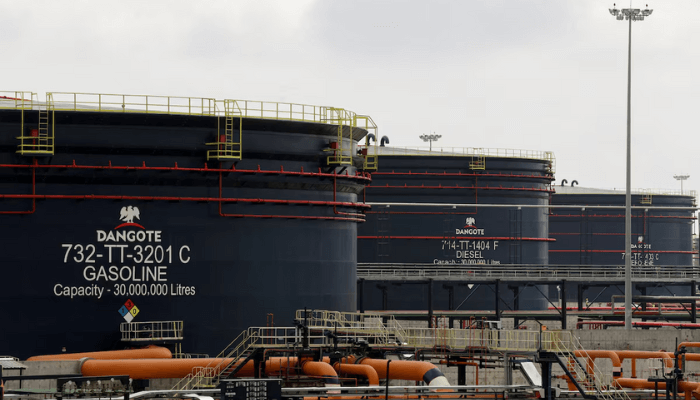Nigeria’s imports of refined petroleum products from Malta have fallen sharply by 60 percent in 2024, marking a major shift in the country’s downstream fuel supply pattern. The drop comes as the Dangote Petroleum Refinery continues to increase its output, providing more locally refined products and reducing dependence on foreign supplies.
Fresh data from TradeMap show that Nigeria’s imports of petroleum oils and oils obtained from bituminous minerals from Malta fell to about $818 million in 2024, down from more than $2.1 billion in 2023. This sharp decline signals that the country may be gradually moving away from unusual import routes and strengthening its domestic refining capacity.
Between 2017 and 2022, Nigeria recorded no major petroleum imports from Malta. However, in 2023 the story changed as the country suddenly imported over $2.1 billion worth of petroleum products from the small Mediterranean island. At the time, several industry observers linked the surge to alleged blending plants and questionable routing of shipments. Aliko Dangote, chairman of Dangote Industries, even claimed that some individuals connected to the Nigerian National Petroleum Company Limited, along with some oil traders and terminals, had opened a blending facility in Malta. The claim raised fresh concerns about transparency in the fuel supply chain, foreign exchange outflows and the credibility of Nigeria’s petroleum import system.
The picture began to change in 2024 when the 650,000-barrel-per-day Dangote Refinery, Africa’s largest single-train refining complex, started producing diesel and aviation fuel, followed by petrol. With new domestic supply becoming available, the import pattern gradually shifted. Energy analysts say the decline in Malta-origin imports is partly due to rising output from the new refinery. Reports show that by the first quarter of 2025, Nigeria’s petrol import bill fell by 54 percent year-on-year, largely because Dangote’s refinery boosted national supply.
Another shipping industry report revealed that Nigeria’s seaborne imports of clean petroleum products dropped by about 39 percent in the first seven months of 2025, compared to the same period in 2024. This decline also followed the start-up of Dangote’s plant. According to Jide Pratt, country manager of TradeGrid and Chief Operating Officer of AIONA, as domestic refining gains strength, the urgency to import refined petroleum products naturally reduces. Pratt, however, warned that heavy reliance on one major refinery poses its own risks. He explained that whenever the Dangote Refinery shuts down its Residual Fluid Catalytic Cracker (RFCC) for maintenance, petrol production capacity drops from about 70 percent to around 30 percent. He said the Nigerian National Petroleum Company Limited must decide the future of its own non-functioning refineries so that the country does not depend solely on Dangote for local PMS supply.
The 60 percent fall in imports from Malta aligns closely with the growing capacity of the Dangote Refinery in Lagos. The refinery, which is the world’s largest single-train processing facility, has been increasing its output of Premium Motor Spirit (PMS) since it started operations. Earlier reports in late 2025 indicated a general fall in Nigeria’s total seaborne petrol imports, dropping to an eight-year low. The increase in local production by Dangote has been replacing the need for imported fuel from Europe and other regions. Some analysts believe Nigeria may even be on the path to becoming a net exporter of refined petroleum products for the first time in decades.
Meanwhile, fresh data also show a drop in the country’s seaborne crude oil loadings. Nigeria’s loadings averaged 1.676 million barrels per day in October, according to S&P Global Commodities at Sea. This is the lowest level recorded since April 2025, when loadings were 1.539 million barrels per day. The October figure also marks the second straight month of decline after the country recorded 1.756 million barrels per day in September and 1.861 million barrels per day in August. The highest loading level recorded so far in 2025 was in June, when output reached 1.873 million barrels per day. The decline reflects ongoing industry challenges, including pipeline issues, crude theft, and production constraints faced by some oil fields.
The combined drop in crude loadings and refined fuel imports highlights the changing structure of Nigeria’s oil and gas sector. While crude production continues to face pressure, the growth of domestic refining—especially from the Dangote Refinery—is contributing to reduced import dependence. For many industry observers, the latest data point to a long-awaited shift in Nigeria’s petroleum supply chain. If domestic refineries continue to expand output, the country may finally reduce its heavy reliance on imported fuel, save more foreign exchange, and strengthen energy security.
